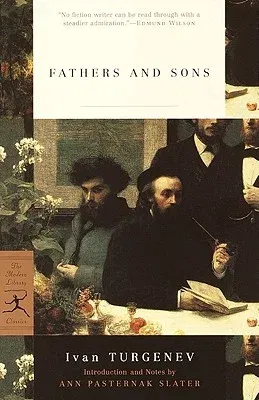Ivan Sergeevich Turgenev
(Author)Fathers and SonsPaperback, 13 November 2001

Qty
1
Turbo
Ships in 2 - 3 days
Only 2 left
Free Delivery
Cash on Delivery
15 Days
Free Returns
Secure Checkout

Part of Series
Modern Library Classics
Part of Series
Modern Library Classics (Paperback)
Print Length
256 pages
Language
English
Publisher
Modern Library
Date Published
13 Nov 2001
ISBN-10
0375758399
ISBN-13
9780375758393
Description
Product Details
Author:
Book Format:
Paperback
Country of Origin:
US
Date Published:
13 November 2001
Dimensions:
20.42 x
13.16 x
1.65 cm
ISBN-10:
0375758399
ISBN-13:
9780375758393
Language:
English
Location:
New York, NY
Pages:
256
Publisher:
Weight:
217.72 gm